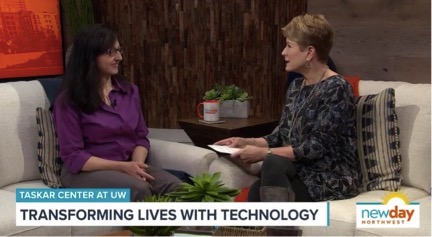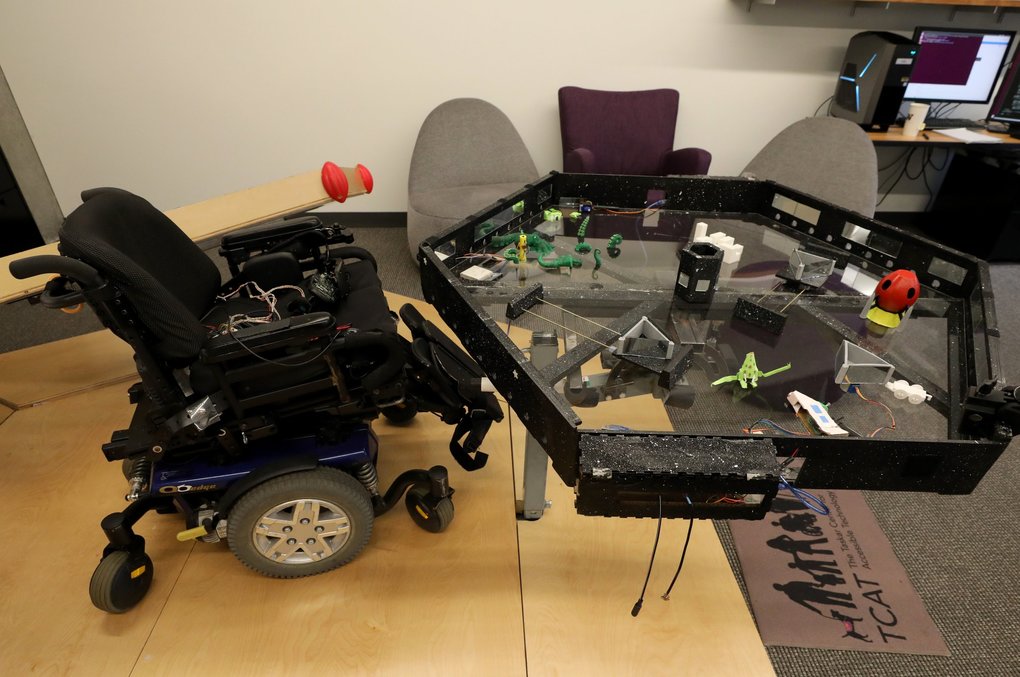April 9, 2025 AccessMap was created in the Taskar Center for Accessible Technology (TCAT), which is led by CREATE associate director Anat Caspi. When it was launched in 2017, data was limited to parts of Seattle. Over the years, it has expanded to other cities near the Salish Sea, including Everett, Mount Vernon and Bellingham. “Not only are we including all sidewalks in Washington, which is huge, but we are engaging communities and planners in a massive effort to support data production and…
Category: Anat Caspi news articles
Anat Caspi speaks at White House panel on AI in Transportation
June 17, 2024 CREATE associate director Anat Caspi spoke on ‘Mapping, Visualizing, and Building the Future’ as part of a White House panel on AI in Transportation. Focused on developing a national transportation infrastructure observatory and an accompanying application ecosystem, the panel gathered innovators in transportation, aiming to align end users, researchers, entrepreneurs, and federal agencies while addressing privacy, cybersecurity, and policy challenges. Dr. Caspi highlighted the Taskar Center’s pioneering work on AI and transportation, particularly through the Transportation Data…
Anat Caspi receives Human Rights Educator Award
Congratulations to Anat Caspi on receiving the 2023 Human Rights Education Award from the Seattle Human Rights Commission! Caspi, a CREATE associate director and the founder and director of the Taskar Center for Accessible Technology, thanked the commission for recognition of her individual dedication and emphasized that it also celebrates the collective efforts of the Taskar Center community. You can watch as Olivia Quesada accepts the award on Caspi’s behalf at the ceremony.
Deep Gratitude to Wobbrock, Ladner & Caspi
June 13, 2023 The CREATE community thanks three of our founding leaders for their energy and service in launching the center as we embark upon some transitions. “CREATE would not be where it is today without the vision, passion, and commitment that Jake, Richard, and Anat brought to their work leading the center,” says CREATE Director Jennifer Mankoff. Co-Director Jacob O. Wobbrock: From vision, to launch, to sustainable leadership It was back in June 2019 that Jacob O. Wobbrock, CREATE’s…
$1M NIDILRR award for leadership training program
A team of CREATE faculty has received a five-year, $1M grant from the National Institute on Disability, Independent Living, and Rehabilitation Research (NIDILRR) for the project, “ARRT: Postdoctoral Training in Physical Computing and Fabrication to Support Innovations for Community Living and Participation.” Congratulations on the funding to the team members: Co-PI Jennifer Mankoff, Ph.D and Professor Paul G. Allen School of Computer Science and Engineering Co-PI Anat Caspi, Ph.D. and Principal, Paul G. Allen School of Computer Science & Engineering…
The Future of Assistive Technology: A Panel Discussion
Anat Caspi participated in a panel discussion on the future of assistive technology and how recent innovations are likely to affect the lives of people with disabilities.
Accessible CS Education workshop focuses on inclusive experiences
Amid a global pandemic, innovative thinkers have been hard at work developing plans to improve equity in modern learning environments. The Accessible Computer Science Education Fall Workshop was held November 17-19, 2020, and jointly sponsored by Microsoft, The Coleman Institute for Cognitive Disabilities, and CREATE. Each day of the event focused on strategies to improve classroom experiences for students and faculty with disabilities. You can watch recorded sessions where speakers provided a wide range of perspectives on computer science pedagogy…
Caspi to lead collaborative $11.45M Transportation Data Equity Initiative
February 3, 2021 Tools like Google Directions and OneBusAway give up-to-date travel and transit information to make regional transit easier for most. But mobility applications focus on efficiency and shortest paths, leaving out information critical to people with disabilities, older adults, and anybody needing more support. The Taskar Center for Accessible Technology, led by CREATE Associate Director for Translation Anat Caspi, and the UW’s Washington State Transportation Center will work with Microsoft, Google, the Washington Department of Transportation and other…
AccessComputing shares UW CREATE’s launch and work toward accessibility
CREATE faculty are already internationally recognized for their contributions to assistive technology and accessible computing; by bringing them together under one organizational roof, CREATE will enable synergies and foster collaborations that enable faculty and students to become more than the sum of their parts.
Designing for the fullness of human experience

Anat Caspi and Taskar Center featured on King 5’s New Day Northwest A familiar face joined Margaret Larson on New Day NW this morning. Anat Caspi, Director of the Taskar Center and Director of Translation for the UW Accessibility Center, shared recent innovations from robotics to smart, sensing environments. Technology design has taken this stance about designing for the “average” person. And in many cases that is a big design mismatch to the needs and preferences of people who are…
With AI and other tech, Anat Caspi focuses on helping people with disabilities
CREATE Director for Translation Anat Caspi shares her research goals and inspiration, including the value of her first programming class and her perspective as a parent. In her role as the director of the University of Washington’s Taskar Center for Accessible Technology, Caspi creates technology focused on people with disabilities such as motor limitations, in many instances applying artificial intelligence (AI). “It’s really about treating people as humans with different needs and preferences,” she says. She sees the mapping of pedestrian…
With AI and other tech, Anat Caspi focuses on helping people with disabilities

The Seattle Times | August 4, 2019 In her role as the director of the University of Washington’s Taskar Center for Accessible Technology, Caspi creates technology focused on people with disabilities such as motor limitations, in many instances applying artificial intelligence (AI). “It’s really about treating people as humans with different needs and preferences,” she said as a cyclist passing by rang a bell. She sees the mapping of pedestrian infrastructure — walkways, sidewalks, overpasses, underpasses and trails — as a necessary…